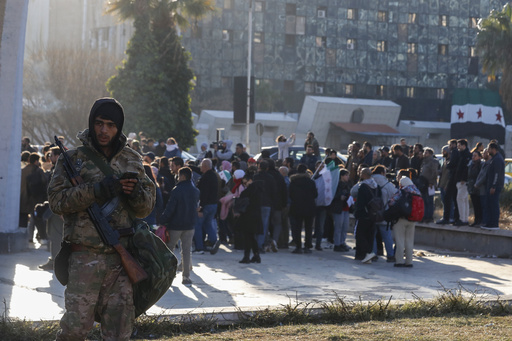In a significant step, a delegation of U.S. diplomats has arrived in Damascus, marking the first such visit since President Bashar Assad was ousted earlier this month. This group, which includes Assistant Secretary of State for Near Eastern Affairs Barbara Leaf, former special envoy for Syria Daniel Rubinstein, and the chief envoy for hostage negotiations Roger Carstens, aims to engage with Syria’s new leadership and gather information on the case of Austin Tice, an American journalist who has been missing since 2012.
This visit also holds historical importance, as it is the first official presence of American diplomats in Syria in over a decade, following the closure of the U.S. embassy in Damascus in 2012. The State Department highlighted that the delegation will interact directly with various segments of Syrian society, including civil society members, activists, and representatives from diverse backgrounds. They aim to listen to local perspectives on Syria’s future and to explore how the U.S. might assist in that endeavor.
Among the primary objectives of the delegation is to seek updates regarding Tice’s whereabouts. The Biden administration emphasizes the importance of principles such as inclusion, the protection of minority rights, and the firm rejection of terrorism and chemical weapons as crucial prerequisites for any U.S. support of a new Syrian government.
The U.S. has intensified its efforts to locate Tice and secure his return, maintaining communication with the rebel factions responsible for the overthrow of Assad. Roger Carstens had previously traveled to Lebanon in pursuit of information regarding Tice. The journalist, whose work has been published in major outlets including The Washington Post, vanished while navigating a checkpoint in a volatile region near Damascus amid escalating civil conflict.
Days following his disappearance, a video surfaced showing Tice blindfolded and held by armed individuals, expressing fear and invoking a plea to Jesus. Since then, there have been no updates on his status, and the Assad government has publicly denied holding him.
The rebel group that played a significant role in Assad’s ousting, Hayat Tahrir al-Sham (HTS), is classified as a foreign terrorist organization by the U.S. and other nations. While engaging with this group comes with its own set of sanctions, it does not obstruct U.S. officials from communicating with its leaders. The State Department confirmed that the diplomats would meet with HTS representatives, although it remains unclear if Ahmad al-Sharaa, the group’s leader formerly linked with al-Qaida, will be among those they encounter.
U.S. officials have expressed cautious optimism regarding al-Sharaa’s public affirmations about the protection of minority and women’s rights; however, they harbor doubts about his long-term commitment to these issues.
Since the suspension of its diplomatic activities in Syria in 2012, the U.S. has maintained a limited military presence in the region, focused primarily on combating the Islamic State group. Recently, the Pentagon disclosed that troop levels in Syria have doubled as part of efforts to counter IS activities, alongside a noticeable increase in airstrikes aimed at preventing the resurgence of terrorism following Assad’s removal.
Although this diplomatic mission symbolizes a potential thaw in U.S.-Syria relations, it will not lead to the immediate reopening of the U.S. embassy, which currently operates under the protection of the Czech government. U.S. officials indicate that any decisions regarding diplomatic recognition will depend on the intentions of Syria’s new authorities.


